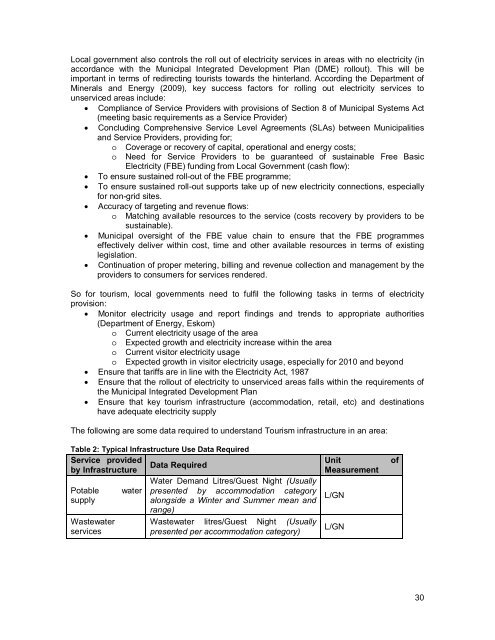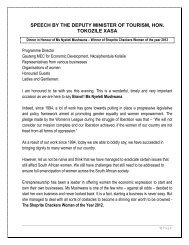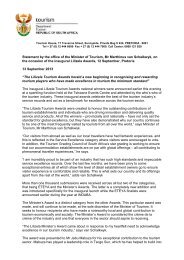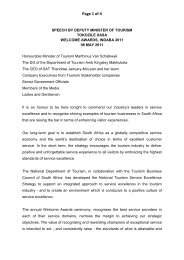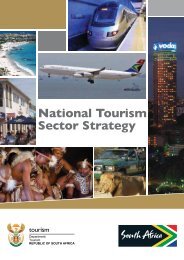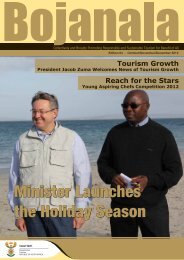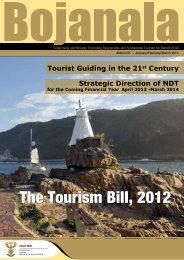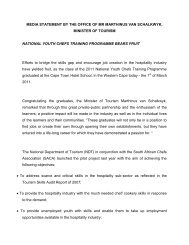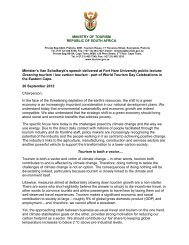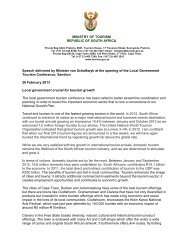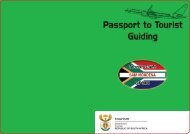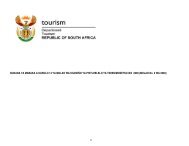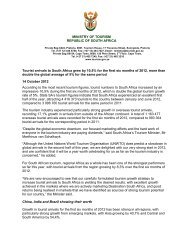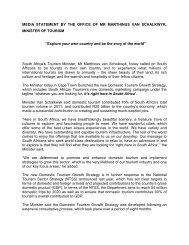The South African Tourism Planning Toolkit - Department of Tourism
The South African Tourism Planning Toolkit - Department of Tourism
The South African Tourism Planning Toolkit - Department of Tourism
You also want an ePaper? Increase the reach of your titles
YUMPU automatically turns print PDFs into web optimized ePapers that Google loves.
Local government also controls the roll out <strong>of</strong> electricity services in areas with no electricity (inaccordance with the Municipal Integrated Development Plan (DME) rollout). This will beimportant in terms <strong>of</strong> redirecting tourists towards the hinterland. According the <strong>Department</strong> <strong>of</strong>Minerals and Energy (2009), key success factors for rolling out electricity services tounserviced areas include: Compliance <strong>of</strong> Service Providers with provisions <strong>of</strong> Section 8 <strong>of</strong> Municipal Systems Act(meeting basic requirements as a Service Provider) Concluding Comprehensive Service Level Agreements (SLAs) between Municipalitiesand Service Providers, providing for;o Coverage or recovery <strong>of</strong> capital, operational and energy costs;o Need for Service Providers to be guaranteed <strong>of</strong> sustainable Free BasicElectricity (FBE) funding from Local Government (cash flow): To ensure sustained roll-out <strong>of</strong> the FBE programme; To ensure sustained roll-out supports take up <strong>of</strong> new electricity connections, especiallyfor non-grid sites. Accuracy <strong>of</strong> targeting and revenue flows:o Matching available resources to the service (costs recovery by providers to besustainable). Municipal oversight <strong>of</strong> the FBE value chain to ensure that the FBE programmeseffectively deliver within cost, time and other available resources in terms <strong>of</strong> existinglegislation. Continuation <strong>of</strong> proper metering, billing and revenue collection and management by theproviders to consumers for services rendered.So for tourism, local governments need to fulfil the following tasks in terms <strong>of</strong> electricityprovision: Monitor electricity usage and report findings and trends to appropriate authorities(<strong>Department</strong> <strong>of</strong> Energy, Eskom)o Current electricity usage <strong>of</strong> the areao Expected growth and electricity increase within the areao Current visitor electricity usageo Expected growth in visitor electricity usage, especially for 2010 and beyond Ensure that tariffs are in line with the Electricity Act, 1987 Ensure that the rollout <strong>of</strong> electricity to unserviced areas falls within the requirements <strong>of</strong>the Municipal Integrated Development Plan Ensure that key tourism infrastructure (accommodation, retail, etc) and destinationshave adequate electricity supply<strong>The</strong> following are some data required to understand <strong>Tourism</strong> infrastructure in an area:Table 2: Typical Infrastructure Use Data RequiredService providedData Requiredby InfrastructureWater Demand Litres/Guest Night (UsuallyPotable water presented by accommodation categorysupplyalongside a Winter and Summer mean andrange)WastewaterservicesWastewater litres/Guest Night (Usuallypresented per accommodation category)UnitMeasurementL/GNL/GN<strong>of</strong>30


